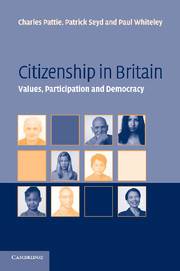Book contents
- Frontmatter
- Contents
- List of Figures
- List of Tables
- Acknowledgements
- Preface
- 1 What is Citizenship?
- I Understanding Citizenship
- II Modelling Citizenship
- III The Consequences of Citizenship
- 7 So What? The Consequences
- 8 The Dynamics of Citizenship
- 9 Challenges to Citizenship in Contemporary Britain
- Appendices
- Bibliography
- Index
9 - Challenges to Citizenship in Contemporary Britain
Published online by Cambridge University Press: 22 September 2009
- Frontmatter
- Contents
- List of Figures
- List of Tables
- Acknowledgements
- Preface
- 1 What is Citizenship?
- I Understanding Citizenship
- II Modelling Citizenship
- III The Consequences of Citizenship
- 7 So What? The Consequences
- 8 The Dynamics of Citizenship
- 9 Challenges to Citizenship in Contemporary Britain
- Appendices
- Bibliography
- Index
Summary
In this concluding chapter we do three things. Firstly, we summarise some of the key findings from the earlier chapters as a way of addressing the question posed in chapter 1: ‘What does it mean to be a British citizen in the early twenty-first century?’ Secondly, we go on to examine some of the changes that have taken place in the key indicators of citizenship over time, linking these to some of the earlier findings. Thirdly, we consider the implications of our findings for citizenship in Britain in the future. These results pose challenges to British society and the political system, and so we spend some time considering these challenges.
What does citizenship mean?
The findings in this book make it possible to begin to answer the question posed in chapter 1. The starting point of an answer to this question is to divide citizenship into two related aspects involving attitudes and beliefs on the one hand and behaviour on the other. We explored the former in chapter 2 and the latter in chapters 3 and 4 before going on to discuss the determinants of such attitudes and behaviour in chapters 5 and 6.
We explored many facets of attitudes to citizenship in chapter 2, examining identities, inter-personal trust, institutional trust, tolerance, and perceptions of government among other things. The common thread running through the discussion was the attempt to understand the relationship between the individual and the state.
- Type
- Chapter
- Information
- Citizenship in BritainValues, Participation and Democracy, pp. 262 - 284Publisher: Cambridge University PressPrint publication year: 2004



